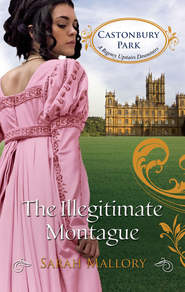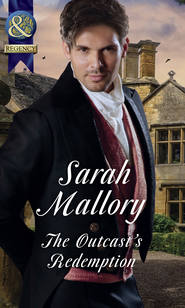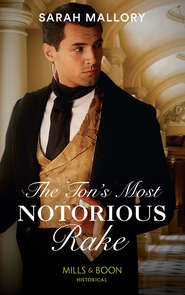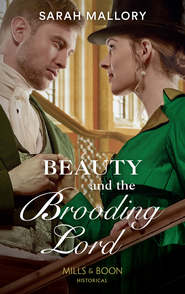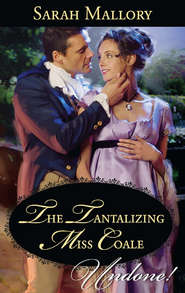По всем вопросам обращайтесь на: info@litportal.ru
(©) 2003-2025.
✖
One Snowy Regency Christmas: A Regency Christmas Carol / Snowbound with the Notorious Rake
Автор
Год написания книги
2019
Настройки чтения
Размер шрифта
Высота строк
Поля
There was a pause in the music and he heard the laughter of young girls—saw a pair, still in the schoolroom, winding about the furniture in a game of tag.
‘Do you not wish they would stop?’ the ghost prodded gently. ‘It is most tiresome, is it not? All the noise and the bustle?’
‘No. It is wonderful.’ For all the quiet dignity of the party he was throwing, there was something lost. It lacked the life of this odd gathering so bent on merriment. He could see village folk amongst them—the grocer, the miller and younger versions of the same weavers who had threatened only yesterday to break the frames in his factory. But now they danced with the rest, as though they were a part of the household.
He cast a questioning glance at the ghost.
‘It is the annual Tenants’ Ball,’ Sir Cedric supplied. ‘Held each Christmas night—until the last owner could no longer keep the spirit of the season or afford the house.’
‘Perhaps if he had been a wiser steward of his money and not spent it on frivolities such as this he would still reside here.’ But his own conscience told him that was an unfair charge. The celebration he was throwing was far more elaborate than this, and not a tenth as happy.
‘He seems successful enough there, doesn’t he?’ Sir Cedric raised his stick and pointed towards the corner, where stood Anne’s father, Mr Clairemont, looking happier and less careworn than he had done since Joseph had known him. And there was Mrs Clairemont, who showed a change even more drastic. Eleven years ago she had been a gracefully aging beauty. Now she was grey, pinched and nervous.
‘Whatever the reason, the Clairemonts are gone from here and none of your concern. I hear the house is held by a harsher master now.’ The ghost gave him a look one part disappointment and one part disapproval, followed by another heavy sigh.
‘I am harsh because I did not invite the whole village for Christmas dinner?’ Joseph waved a hand at the assembly. ‘How was I expected to know of this? It is not as if I was born of this area. The cottage we began the night in was miles from here. Clairemont said nothing of this responsibility when he sold me the house.’
‘And you are so tragically robbed of speech that you could not enquire.’ The ghost nodded in mock sympathy.
Now the lord of the manor was offering baskets to the families that had come, shaking hands and slapping backs as though every last man was an old friend. If the Clairemonts were still in the house, it must mean that the woman he now meant to marry was somewhere in the throng—and no older than the girls at play. He searched for the pair he had seen and dismissed earlier, but there were so many children, and they seemed to swarm out of doorways and hiding places, tearing down the halls, heedless of the other guests.
Then he spied Anne. Even now he could not quite manage to think of her as ‘his’ Anne. The unfamiliarity of her youth made it no easier. This little girl was as unlike her in manner as she was like in face. In childhood there had been none of the sombre grace that the woman carried now. She was a mischievous imp who did not care that her hair ribbons had come untied so long as she was not caught by the one who followed.
And the other, following close on her heels, was just alike. A twin? Or very nearly so? For the girls were very similar in looks. If they were not birthed together, then no more than a year could have separated them.
‘Mary! Anne! Wait for me.’ A third girl appeared, as though out of nowhere, seemingly forgotten as the game of hide-and-seek went on without her. When he turned to the sound of her voice he saw a hanging on the wall that had concealed her still rustling back into place.
Focused as she was on the two who had passed, she did not see him until it was too late, striking his legs with a surprisingly solid thump. ‘Excuse me, sir.’
As he reached out a hand to steady her, her little face turned up to his. Barbara Lampett. It must be her. For there was the same turned-up nose. And those were her blue eyes, as bright and searching as a beacon, with the curiosity of unvarnished youth. No one had told her not to stare, or taught her to cloak the energy of her spirit in courtesies and false manners.
He felt the same connection he had at the riot, and again in this very hall. But this was different. Tonight she knew nothing about him. She’d had no chance to form an opinion, no reason to think him anything less than a gentleman. She had no cause to dislike him. She was smiling at him with those same pursed lips that had shown such disapproval this afternoon.
The thought staggered him. Seeing her here, as she had been, he very much wished that he might have met the girl full-grown tonight, and had even the smallest opportunity to let the woman she had become see him as anything else than an enemy.
He steadied her, and stepped out of her way. ‘No harm done, Miss Lampett. Go and find your friends.’
But the other girls had come back for her, grabbing her hands and pulling her away, paying no heed to him.
‘Barbara, what are you waiting for? Come.’
Then she was gone from him, with one passing look and a tip of her head, as though she could not quite make out his purpose in standing in the hall, staring.
‘Who is the man in the nightshirt?’ she said to the nearest girl, looking back at him again.
‘What man?’ Her friends looked back, through him.
‘I … Never mind.’ Barbara smiled and looked away again, as though the memory of him was already fading.
‘She saw me?’ he said in wonder, looking down at his own hand as though he could still feel the muslin of her gown under his fingers.
‘It seems so,’ said the ghost, barely interested. ‘There are those who see the world around them plainly, and those who don’t. Miss Lampett is more perceptive than most.’
Joseph thought again of her ill opinion of him. That was hardly a sign of keen perception. Her animosity seemed to be shared by most of the community.
‘And some others can learn to see properly if they are shown,’ the ghost added.
‘You are speaking of me, I suppose?’ Joseph answered.
‘You do seem to be most singularly blind to your surroundings.’
‘I see it more as an ability to avoid distractions and to focus on the future.’
‘Really?’ It was more a question than a statement. ‘The future is not my purview. There is another …’ The ghost stopped for a moment and gave a slight shudder. ‘You will see soon enough how clear a view of the future you hold. But for now I bring you to the past so that you might learn from it. Do not forget it, my boy.’
‘Stratford! What the devil? Joseph, get up immediately. What are you about, sleeping in a common hallway?’
Joseph started awake, focusing in confusion for a moment on a man’s legs, before looking up into the worried face of Breton. ‘Hallway?’ he echoed in puzzlement, struggling to remember the details of the previous evening. It had begun normally enough. But now …
He looked around him. He was slumped on the floor in the hall, in front of the ballroom, still clad in his nightclothes. He stood up quickly, glancing around to make sure they were alone. ‘Did anyone …?’
‘See you? Dear God, I hope not. I am sure we will hear of it if they have. But you must consider yourself fortunate that I am an early riser and can help you out of this fix. What happened?’
‘I am not sure. I must have roamed in my sleep. I had a very vivid dream.’ And vivid it must have been. He could see the bruise on his hand where he had pinched himself. And feel a small knot on his skull where he had been rapped by the Cavalier’s beribboned walking stick.
‘Well, you look like the very devil. Grey as a paving stone and just as cold.’
Joseph turned behind him to the curtain that hung on the wall and swept it aside, to reveal a small alcove with a stone bench just large enough to hide a pair of lovers. Or a girl playing at hide-and-seek.
‘I did not know of this before now,’ he said numbly to his friend. ‘But I dreamed it was here.’
Breton was staring at him as though he were as barmy as Bernard Lampett. ‘If you wish to search the house for priests’ holes, it might be best to continue when fully dressed.’
‘Perhaps so.’ He frowned. ‘But I am surprised I had not noticed this before.’
His friend took him by the arm, tugging him towards the back stairs. ‘That is little shock to me. It has nothing to do with the running of the mill. That is all you seem to care about lately.’
‘Unfair,’ Joseph charged. ‘I care about many things. It is not as if I am made of clockwork, you know.’ Who had told him he was?
They mounted the steps and Breton hurried him towards his room, his valet and his clothing. ‘Sometimes I wonder. But, if you have them, tell me of these other interests. I defy you to name one.’
Now that he was pressed, Joseph could not seem to think of any. Unless he could count Lampett’s fractious daughter as an interest. If the spirit of Sir Cedric had taught him anything, it was of his desire to see another of the smiles she had worn as a child.
In response to his silence Bob gave a snort of disgust. When he spoke, the amusement in his voice had been replaced with sincere annoyance. ‘That was where you should have announced your excitement at your impending engagement. Have you forgotten that as well?’
‘Of course I have not forgotten.’ But he had responded too late to be believable.
‘I might just as well have included it as part of your business. It is little more than that to you, isn’t it?’






